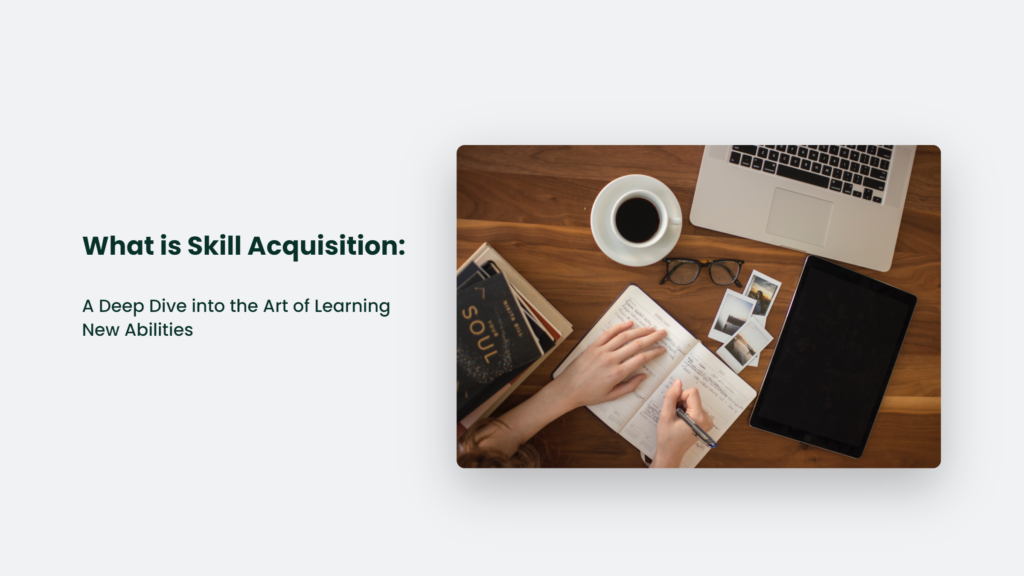Skill acquisition. It’s a phrase tossed around in boardrooms, classrooms, and even on the sports field. But what is skill acquisition? And why is it so crucial in our lives?

What is Skill Acquisition?
Skill acquisition, in its simplest form, is learning new abilities and honing them to near perfection. It’s the journey from clumsy first attempts to effortless execution. It’s the transformation from novice to master. But why should we care about it? With skill acquisition, we’d all be toddlers, struggling to tie our shoelaces or ride a bike.
You might be thinking, “But I’m not a toddler. I’ve acquired plenty of skills.” And you’d be right. But here’s a hypothetical question: Are you content with your current skill set, or do you aspire to learn more, do more, and be more?
The Stages of Skill Acquisition
- Cognitive Stage: The inception of skill acquisition involves recognizing the need for a new skill. This stage thoroughly analyses existing skills and the decision-making process regarding the learning method, whether through self-study or formal education.
- Associative Stage: Connections are formed between the newly acquired skill and existing knowledge. It’s a stage of integration where repetition plays a crucial role in solidifying understanding.
- Autonomous Stage: The pinnacle of skill acquisition, where the skill becomes second nature. Overcoming challenges like failure and adapting strategies based on feedback lead to proficiency, where the skill is executed effortlessly.
The Science Behind Skill Acquisition
Skill acquisition isn’t just about learning to do something new. It’s a complex process involving the brain, the body, and a lot of practice. According to research, skill acquisition occurs in three stages: the cognitive stage, the associative stage, and the autonomous stage.
- The cognitive stage is where you’re introduced to a new skill. You’re trying to understand the task and make sense of it. It’s like trying to solve a Rubik’s cube for the first time.
- The associative stage is where the magic starts to happen. You begin to see patterns, make connections, and improve your performance. It’s like finally seeing how the colours on the Rubik’s cube can align.
- The autonomous stage is where the skill becomes second nature. You can perform the task without even thinking about it. It’s like solving the Rubik’s cube with your eyes closed.
The Power of Skill Acquisition
“Give a man a fish, and you feed him for a day. Teach a man to fish, and you feed him for a lifetime.” This ancient proverb perfectly encapsulates the power of skill acquisition. It’s not just about learning a new skill; it’s about empowering yourself for a lifetime.
Consider this: A study found that individuals continually acquiring new skills are more likely to succeed in their careers. Another study revealed that skill acquisition is crucial to personal development and mental health.
The Art of Skill Acquisition
Now, let’s get down to the nitty-gritty. How do you acquire a new skill? Is there a secret formula or a magic potion? Unfortunately, no. But there are proven strategies that can help you on your journey.
- Set clear goals: Know what you want to achieve and why.
- Practice, practice, practice: Remember, practice makes perfect.
- Seek feedback: Constructive criticism can help you improve.
- Stay patient: Rome wasn’t built in a day, and neither will your new skill.
Frequently Asked Questions:
What is skill acquisition?
Skill acquisition is the process of learning new abilities and honing them to near perfection.
Why is skill acquisition important?
Skill acquisition is crucial for personal and professional development. It can lead to career success and improved mental health.
How can I acquire a new skill?
You can acquire a new skill by setting clear goals, practicing regularly, seeking feedback, and staying patient.
Conclusion: Embracing the Journey of Skill Acquisition
Skill acquisition is not just about learning; it’s about transforming. It’s a continuous process of adapting, refining, and mastering skills to stay relevant and capable in our dynamic world.


